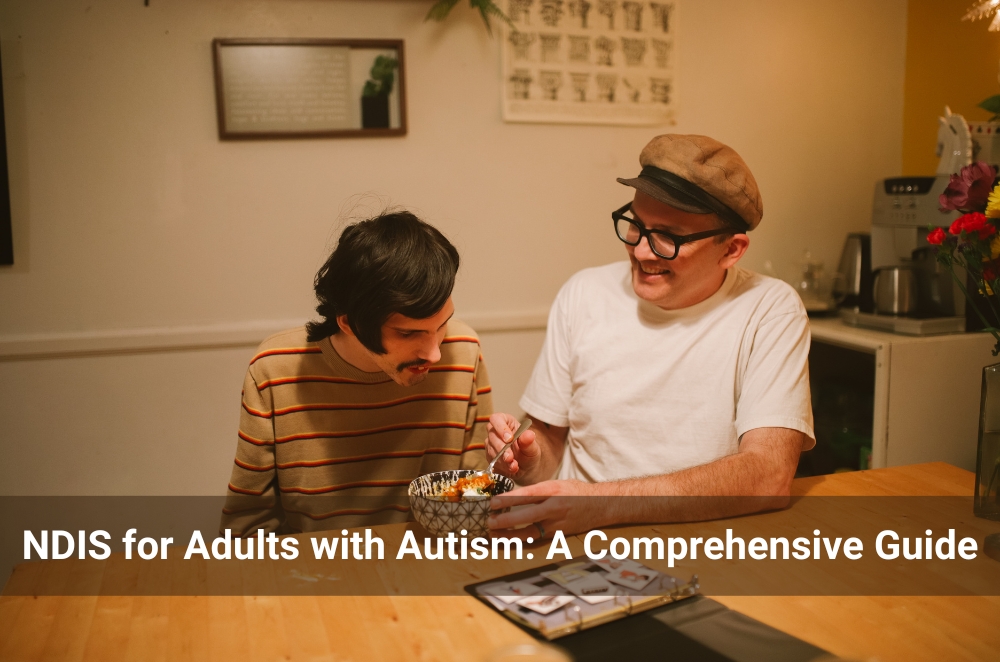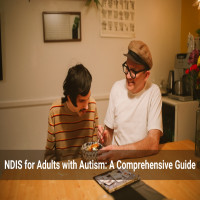NDIS for Adults with Autism: A Comprehensive Guide

Strong 8k brings an ultra-HD IPTV experience to your living room and your pocket.
Feeling lost in the NDIS maze as an adult with autism? Many individuals on the spectrum find the process of accessing support through the National Disability Insurance Scheme (NDIS) incredibly daunting. People with autism are expected to deal with all these difficulties and, at the same time, struggle to find their way through a labyrinth of bureaucratic language, documents, and procedures that seem never to end.
At this point, it feels like searching for a book in a library without a card catalogue; you are aware that the information is in there, but getting to it is really a challenge. Since such access is a significant challenge, the level of independence, health, and overall quality of life can be considerably affected. For those seeking targeted assistance, finding the right NDIS services for autism in Sydney can be an exceptionally overwhelming task. This comprehensive guide aims to simplify the NDIS journey for adults with autism, providing clear, practical steps to navigate the system effectively and access the support needed to thrive.
Understanding NDIS Eligibility for Autism
So, who is NDIS support meant for? NDIS helps individuals with a permanent and profound disability related to their ability to take part in daily activities. For an adult with autism, this means that the condition has to significantly affect the individual's life. This can manifest in many different ways; examples are difficulties with social interaction and communication or even sensory processing.
• Social interaction and communication
• Sensory processing
• Executive functioning (planning, organisation, and task completion)
• Emotion and behaviour regulation
Developing your NDIS plan
It is a significant time and requires an active role by clearly stating needs and goals. A good plan should be personalised and particularised, addressing the unique situation and objectives of the individual. Understanding the value of tailored support planning is crucial, as it ensures that the NDIS plan aligns with your specific needs and goals. Some key parts of developing a plan include:
• Identifying your support needs: Consider what type of assistance you require, including personal care, social participation, and accessing therapy.
• Setting goals: What do you want to get from the NDIS support? Ensure they are SMART-specific, measurable, achievable, relevant, and time-bound.
• Working with a planner: An NDIS planner will guide you through this process and may help you express your needs. They will develop a plan customised to your needs and requirements.
Types of NDIS support for adults with Autism
NDIS provides countless supports that are tailor-made to the needs of an individual. Some common supports offered to adults with autism include:
• Support coordination involves identifying participants who require assistance in managing their plans, including help accessing the NDIS scheme.
• Plan management: It includes the NDIS plan funds, such as the payment of the service providers and the expenditure rate.
• Assistance with daily living: It is adequate help with grooming, house chores, cooking, and many other events in one’s life.
• Social and community participation: It permits and enables people's social and interpersonal interactions and involvement with and in their neighbours.
• Therapy services: Depending on the individual’s needs, therapy services include speech therapy, physiotherapy, behaviour therapy, and occupational therapy.
Accessing therapy services through the NDIS
Occupational therapy is beneficial to adults with autism as it provides them with services they need to develop skills, handle problem areas and enhance their quality of life. Accessing these services through the NDIS involves:
• Identifying therapy needs: This method needs to determine which kind of therapy is most helpful. This is usually done through discussions with doctors, general practitioners, psychologists, psychiatrists and support officers who have prior knowledge of the subject.
• Finding qualified therapists: The search for therapists who have already started building their working experience with adults with autism is one of the key challenges that have to be solved.
• Requesting funding in your plan: It is critical to ensure that your NDIS plan explicitly includes funding for the necessary therapy services. This involves clearly outlining the types of therapy required and their anticipated frequency during the planning process.
• Mindfulness techniques can also significantly help adults with autism manage stress and improve emotional regulation. Exploring relaxation techniques for mindfulness can complement therapy and foster a better quality of life.
Managing your NDIS plan effectively
Managing an NDIS plan can be complex, but with the right strategies, it can be done effectively. Some helpful tips include:
• Keeping detailed records: Detailed records of all expenditures on NDIS items, appointments with service providers, and communications with the NDIA or support coordinators are some of the bases for financial accountability and follow-through on progress. The same documents come in handy when reviewing plans.
• Regularly reviewing your plan: Needs and goals may change. Conducting regular reviews helps identify gaps in support, reallocate funds as necessary, and request changes to reflect updated circumstances and current aspirations.
• Seeking support when needed: Feel free to seek support from a support coordinator or plan manager. These professionals have experience in NDIS processes and can offer advice on how to manage your plan, navigate the system, and link up with appropriate services.
Conclusion
Understanding the key steps and available supports can significantly improve an autistic adult's navigation of the NDIS. This resource has demonstrated that a seemingly daunting task—ranging from determining eligibility to creating an individualised plan, accessing necessary therapies, and managing funding effectively—can become more manageable. Each step of the NDIS journey is crucial to achieving personal goals. Identifying support needs, setting accurate and measurable objectives, and connecting with the autism community are vital components of a successful NDIS experience.
While managing an NDIS plan independently is possible, professional support often simplifies the process and maximises the benefits received. Effective plan management includes understanding available resources and engaging with experienced professionals who can guide and empower individuals to make positive, constructive choices toward greater independence. With the proper knowledge, taking action becomes the next step in accessing the support deserved.
Note: IndiBlogHub features both user-submitted and editorial content. We do not verify third-party contributions. Read our Disclaimer and Privacy Policyfor details.


